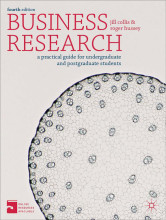Summary: Business Research A Practical Guide For Undergraduate And Postgraduate Students | 9781137037480 | Jill Collis, et al
- This + 400k other summaries
- A unique study and practice tool
- Never study anything twice again
- Get the grades you hope for
- 100% sure, 100% understanding
Read the summary and the most important questions on Business Research A Practical Guide for Undergraduate and Postgraduate Students | 9781137037480 | Jill Collis; Roger Hussey
-
1 PP1 Business research ch 1 2.5 3
This is a preview. There are 23 more flashcards available for chapter 1
Show more cards here -
Classifying research & Classification of main types or research table 1.1. pg 3
Research can be classified by:- Purpose research - the reason why it was conducted | Type of research: exploratory, descriptive, explanatory/analytical, predictive (hypothesis testing) research
- Process of research - the way the data were collected and analysed | Type of research: Quantitative or Qualitative research
- Outcome - whether outcome is the solution to a particular problem or a more general contribution to knowledge: basic or applied research
- Logic research - whether research logic moves from general to specific or vice versa | Type of research: Deductive or inductive research
- Purpose research - the reason why it was conducted | Type of research: exploratory, descriptive, explanatory/analytical, predictive (hypothesis testing) research
-
Quantitative vs qualitative research - Process
Quantitative research - in numbers
Qualitative research - in data in nominal form (interview)- analysing new data using interpretive methods -
Ethic in research SS2.5 Ethics P30
- don't harm participant
- respect dignity - not ridicule participants
- informed consent (before participation) & voluntary participation
- privacy confidentiality
- honesty transparency
- Deception misrepresentation
- Affiliation (family) - conflict of interest
- Reciprocity - beneficial for researcher and participant
- don't harm participant
-
Hallmarks or main distinguishing characteristics of scientific research:
- •Purposiveness (not for fun)
- •Rigor (strict) - sample size
- •Testability (can it be tested?)
- •Precision and Confidence (statistics!)
- •Replicability (can it be repeated?)
- •Objectivity (pure facts)
- •Generalizability (results for whom?)
- •Parsimony (simplest assumption adoption) (staff remunaration increase job satisfaction?
- •Purposiveness (not for fun)
-
Research process pg 9
Choose topic of research - review literature & define research questions - design the research | write proposal - collect research data (qualitative | quantitative)- analyse and interpret data - write report
Paradigm - framework how research should be conducted - starting point of research design CH3
Methodology - approach to process of research encompassing body of methods
Methodologic rigour - appropriateness and intellectual soundness of the research design and the systematic application of the research methods P18 -
Paradigm ch 3 pg 43
framework that guides how research should be conducted based on peoples philosophies and assumptions about the world and nature of knowledge -
Positivism vs Interpretivism P45 book
positivism measures the social phenomena and interpretivism focuses on exploring complexiity of social phenomena with a view of interpretive understanding
Methodological assumption
Positivist: construct you use can be operationalized and describes in such a way it can be measured - large sample - association of variables - focus on objective facts and formulate hypotheses
Interpretivist - small sample over period of time and number of research methods to obtain different perceptions of phenomena and analysis will seek to understand what is happening and lookign for patterns which may be repeated in other similar situations -
Field research (exam 2016) P50
Research based on secondary data in a natural location (workplace) Example: study that evaluates impact of new training scheme on production levels factory. Challenge research in natural setting: control influence of other variables -
Field experiment P60
Experiment in natural setting, strong control over cofounding and extraeous variables -
2 PP2 Theoretical FW & Operational design Handout 1 (93 slides)
This is a preview. There are 24 more flashcards available for chapter 2
Show more cards here -
Hypothetico deductive method
provides useful, systematic approach for generating knowledge to solve basic and managerial problems
steps- identify problem area
- define problem statement
- develop hypothesis - association among variables, with justification as to why they influence the problem | hypothesis must be testable and falsifiable; must be possible to disapprove hypothesis
- determine measures; unresponsive employees affect customer switching; test this hypothesis by operationalizing unresponsiveness and customer switching
- data analysis
- interpretation data
- identify problem area
- Higher grades + faster learning
- Never study anything twice
- 100% sure, 100% understanding
































